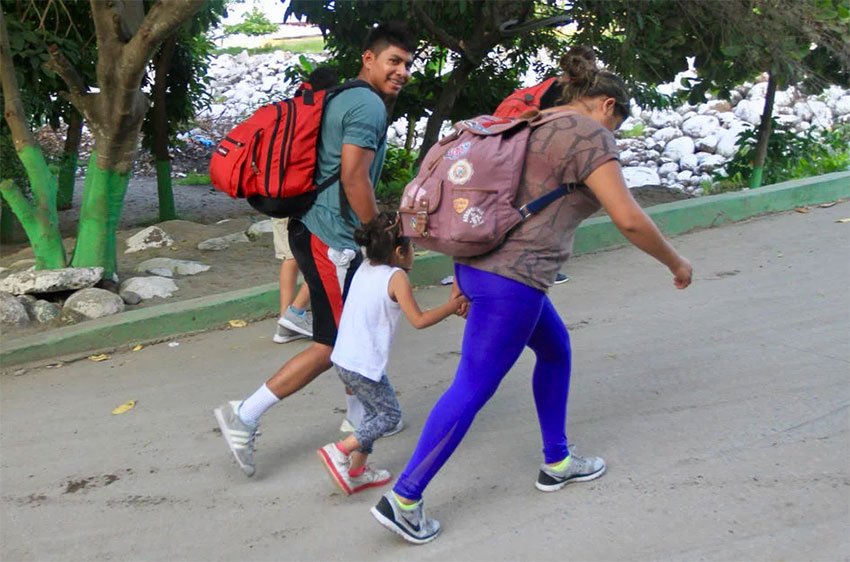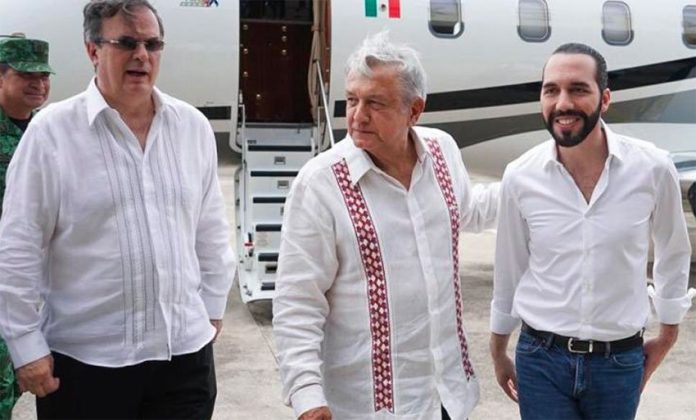The federal government announced that it will provide a US $30-million grant to El Salvador for a reforestation program as part of a development plan that aims to improve economic and social conditions in Central America and slow migration to the United States.
President López Obrador and Salvadoran President Nayib Bukele signed a cooperation agreement for the program in Tapachula, Chiapas, a city just north of the border with Guatemala through which tens of thousands of migrants have passed in recent months.
The reforestation project – which is based on the government’s domestic Sembrando Vida (Sowing Life) program – intends to plant timber-yielding and fruit trees on 50,000 hectares of land in El Salvador and is expected to create 20,000 jobs.
“I’ve always maintained that the countryside is the most important factory in the country,” López Obrador said.
“Everything depends on getting that factory going and that’s what’s being done with this program. It will improve the environment, [create] production and work, and people, especially young people, won’t have the need to go elsewhere to make a living. Mexicans and Central Americans should be able to work and be happy where they were born, where their families, customs and cultures are. That can be achieved with this program.”
The president also said that similar programs are in the works for Honduras and Guatemala, the two other countries in the Northern Triangle of Central America.
High levels of violence and poverty have caused large numbers of people to flee the three countries, many of whom have arrived in Mexico as part of several large migrant caravans that have traveled through the country to the northern border since late last year.
Immigration control, López Obrador said, cannot come only through “the use of force, only coercive measures, closing borders, but through understanding the root of the problem and seeking solutions.”
The announcement of the development program comes as Mexico faces intense pressure from the United States to reduce migration through the country to the northern border.
On June 7, Mexico committed to enforcing stricter immigration policies as part of an agreement with the United States that ended President Donald Trump’s threat to impose escalating tariffs on all Mexican goods.
The effectiveness of Mexico’s anti-migration measures, including the deployment of the National Guard to the southern border, will be assessed by the United States in the third week of next month.

If the measures are considered not to be achieving the desired results, Mexico will take “all necessary steps under domestic law” to implement a safe third country agreement, according to a “supplementary agreement” to the bilateral pact.
Despite the pressure from the United States, Foreign Secretary Marcelo Ebrard said that Mexico is providing the grant to El Salvador without any political or financial conditions.
He added that a Mexican team will go to El Salvador to launch the program as soon as Bukele wishes, explaining “the funds are available to start the program today.”
More than $100 million will eventually be allocated to the program, Ebrard said.
News of the tree-planting project was met with skepticism by Salvadoran migrants at the Mexican Commission for Refugee Assistance in Tapachula.
A 24-year-old man who crossed the border earlier this week told the Associated Press that “it’s very good that they’re providing work” but added that the program won’t work if it doesn’t put an end to violence.
“Even if there are [development] projects, people are going to keep leaving,” said Carlos Vindel, who fled El Salvador after gangs tried to recruit him.
President Bukele, who took office at the start of this month, has promised a crackdown on criminal gangs but according to Vindel, that will only make things “more critical.”
“There will be more violence because the gangs always respond,” he said.
Marisol Martínez, a Salvadoran woman who left El Salvador with her 13-year-old daughter and 14-year-old son due to gang threats said that “poverty is not going to change” as a result of the reforestation program.
In addition to the tree-planting endeavor, the Comprehensive Development Plan for Central American and southern Mexico proposes a range of infrastructure projects including a US $300-million regional electrical interconnection project, a 600-kilometer gas pipeline and a highway linking Guatemala to Tenosique, Tabasco.
Ebrard said last week that Mexico was confident that development in the region “really can [reduce] migration in the short and long term.”
However, in the meantime, the government is left with the dual challenge of stopping the flow of migrants and attending to those who are already here and those who will be returned to Mexico from the United States under an expansion of the so-called “Remain in Mexico” policy.
Mexico’s agreement to take in more asylum seekers as they await the outcome of their claims in the U.S. will place even more pressure on already overcrowded migrant shelters, a situation that has forced some migrants to sleep in parks or on the street.
As they wait for an opportunity to file visa requests in Tapachula, that’s the reality faced by Honduran woman Yesenia Hernández, her husband and their two children. But going home isn’t an option.
“If there were opportunities, work, hospitals and all that, we wouldn’t come,” Hernández said. “And if there was no violence.”
Source: El Financiero (sp), Associated Press (sp), Radio Fórmula (sp)
